German Culture In The USA Posted by Constanze on Feb 22, 2017 in Culture, Language, Traditions
Guten Tag! When you think about countries relating to the German language and culture, the first (perhaps only) countries that come to mind are Germany and Austria. But there are, in fact, many countries around the world that have German as a second or minority language, with towns & cities that have German roots. Today I’d like to talk about the German language and culture in the United States.
Why are there so many Germans in the US?
From the 17th century onwards, there were high levels of German immigrants arriving and settling in the US. They left Germany for a variety of reasons, but were ultimately in search of a better quality of life. In 2014, there were an estimated 46 million people in the United States with full or part German ancestry. That makes Germans the largest single minority group in the US! Who’d have thought it?
But during World War 1 there was a distinct anti-German sentiment in the US, and during this time many aspects of German language and culture were banned, renamed or otherwise played down. Learning German was banned from schools, and German language newspapers were forced to shut down, for example. The repercussions of this may be the reason why German-Americans are not as ‘obvious’ in the US as they should be, given that they are the country’s largest single ethnic group.
German language in the United States
Although there are so many people with German ancestry in the US, the German language itself is not very prominent, nor is German considered an official US language. However, it is very interesting. Most of the German spoken is not Hochdeutsch, but different dialects (Hutterite German, Plattdietsch and Berndeutsch, to name a few). German is also the second most spoken language in several places – North Dakota, for instance. The most notable area where German is still spoken is Pennsylvania. This is home to Pennsylvania German, a dialect which I have written posts about, here and here.
But the influence of the German language in the US is evident in smaller, everyday things which you may not realise at first: The word Kindergarten, for instance. This is a German word which has been adopted and is now a part of ordinary US English (anyone remember the all-time American classic film, Kindergarten Cop?)!
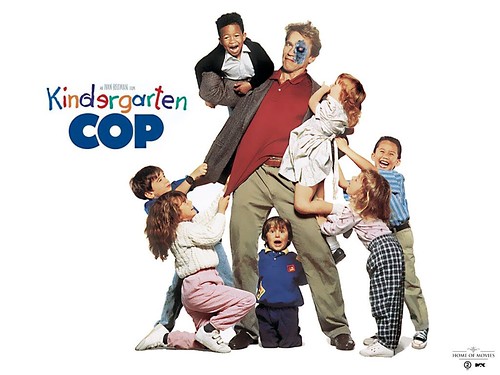
Kindergarten Cop: Kindergarten is a German word that literally translates to ‘Child garden’! Photo by surreal_badger on flickr.com under a CC license (CC BY-SA 2.0)
German culture in the United States
Though the German language might not be all too prominent in the US, the influence of German culture has left its mark in more ways than one. This ranges from architecture, to food, to special events, to even the names of towns and cities!
Architecture
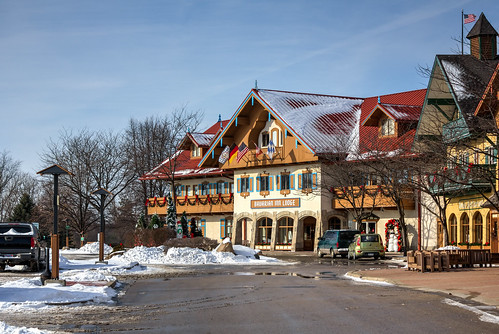
German-style buildings in Frankenmuth, Michigan, USA. Photo by Christopher Woodrich on flickr.com under a CC license (CC BY-SA 2.0)
In towns and cities with German ancestry you’ll see stunning buildings like these, which will make you think you’ve landed in Germany! The buildings pictured are in Frankenmuth, Michigan, and wouldn’t look out of place in Bavaria.
Food
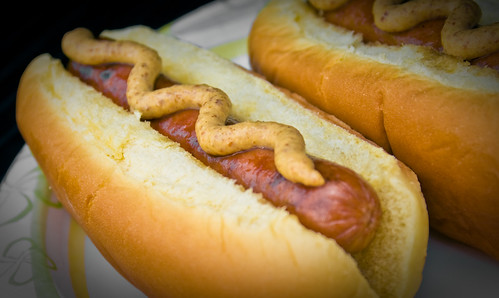
Why are hot dogs called wieners in the US? Photo by thebusybrain on flickr.com under a CC license (CC BY 2.0)
Ever wondered why hot dogs are also called wieners in the US? The word wiener comes from the German word Wien – Vienna! ‘Wiener’ sausages are, in fact, from Vienna (Austria), which is why they have this name. The words Frankfurter and Hamburger are German imports: The Frankfurter comes from Frankfurt, and the Hamburger comes from Hamburg! Then you’ve got Sauerkraut and Pretzels. Sauerkraut is the original German word, while Pretzel is the anglicised form of the German word Brezel.
Special events
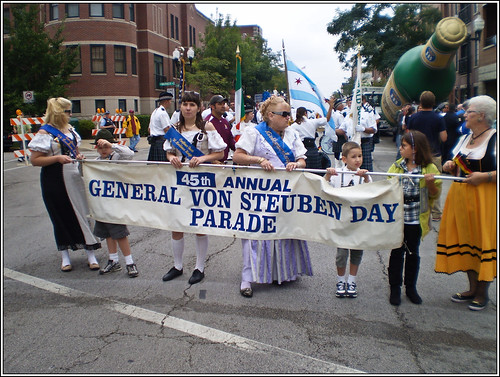
Von Steuben Day Parade. Notice the Bavarian-style Dirndl and the German flag. Photo by gas_station_sushi on flickr.com under a CC license (CC BY-ND 2.0)
Being as popular as it is, there are Oktoberfest (famous Munich beer festival) events held worldwide now. But some US towns & cities with German ancestry hold these events as a direct nod to their roots (rather than as a tourist attraction, for example). There are one or two mentioned in this post, but there are several other US towns with Oktoberfest celebrations. You’ve also got the Von Steuben Parade held in honour of German American Day, which you can read about here!
Names of towns & cities
If you’ve ever come across these US towns/cities and thought they sounded more German than American, then you’d be right. This is all down to their German ancestry.
Here are a few US towns/cities with German names:
Germantown (Tennessee/Maryland/Pennsylvania)
Frankenmuth, Michigan (nicknamed ‘Little Bavaria’)
Fredericksburg, Texas.
Hermann, Missouri.
New Ulm, Minnesota.
Edelbruck, Iowa.
Carlsbad, California.
I know many of you readers are from the US and, judging by the wonderful stories you share with me, many of you also have German ancestry. 🙂 So if you have anything to add to this post, be it to do with language or culture, please do leave a comment! I’d love to hear of any more German town names, traditions, or any regions you’ve visited where you’ve heard German being spoken!
Bis bald,
Constanze x

Build vocabulary, practice pronunciation, and more with Transparent Language Online. Available anytime, anywhere, on any device.



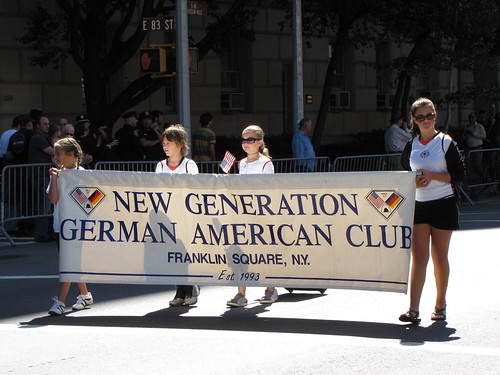
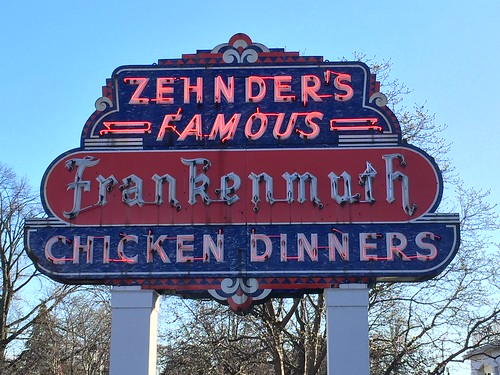

Comments:
Angela:
Hi Constanze! I always love and appreciate your blogs.
Have you ever written anything about the etymology of the word “German”. When the Brits anglicized all the people and places of the world, it’s often clear how the English words came to be (ie: Italy from Italia, Spain from Espana, etc.), but how did they derive “German(y)” from Deutsch(land)?
PS – In your intro paragraph where you said the only countries people think about are Germany and Austria, don’t forget about Schweiz.
Thank you for all you do!
Kathy:
There is also a Germantown in Wisconsin. There is also a “Bavarian village” called Leavenworth, Washington, near the Cascade Mountains. It is famous within the state, and hosts a big Oktoberfest the first three weekends in October every year. This village of around 2000 people hosts over 30,000 visitors during the three weekends of Oktoberfest. Check it out: http://leavenworth.org.
Mike Swanson:
I think it is also very interesting the German names that have survived across the atlantic through our ancestry. When I studied abroad in Germany, I was surprised to arrive at my hostel in Pfrozheim, and see a “Finkbiner” optometrist right across the street. Finkbiner is my mother’s maiden name.
Alexis:
Fort Wayne Indiana has a huge Oktoberfest every year… Unfortunately I’ve never been. Maybe I’ll go this year.
Jay:
When visiting Washington DC make sure to see the Baron Friedrich von Steuben Statute in Lafeyette Square, across Pennsylvania Ave. from the White House.